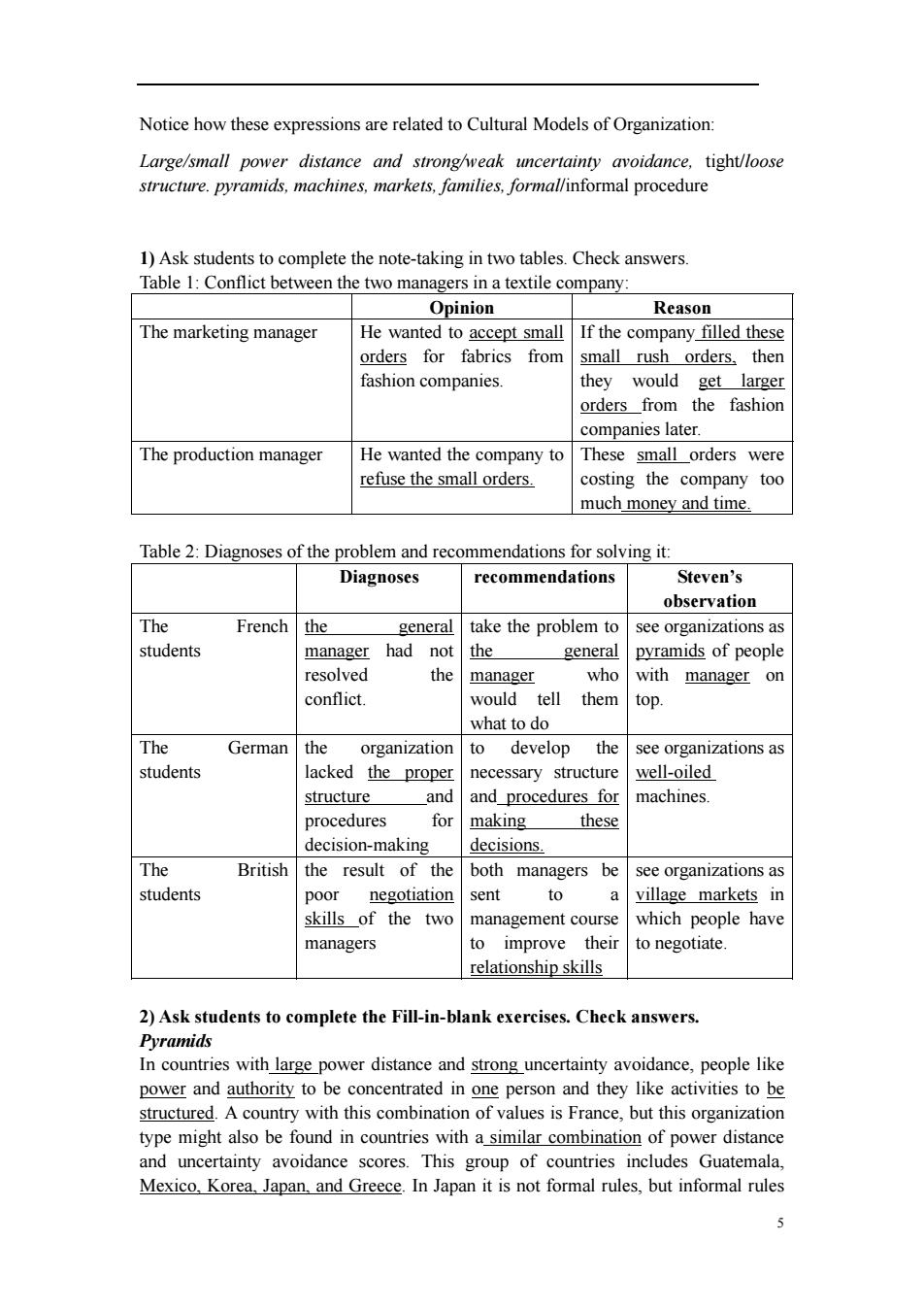正在加载图片...

Notice how these expressions are related to Cultural Models of Organization: Large/small power distance and strong/weak uncertainty avoidance,tight/loose structure.pyramids,machines,markets,families,formal/informal procedure 1)Ask students to complete the note-taking in two tables.Check answers. Table 1:Conflict between the two managers in a textile company: Opinion Reason The marketing manager He wanted to accept small If the company filled these orders for fabrics from small rush orders,then fashion companies. they would get larger orders from the fashion companies later. The production manager He wanted the company to These small orders were refuse the small orders. costing the company too much money and time Table 2:Diagnoses of the problem and recommendations for solving it: Diagnoses recommendations Steven's observation The French the general take the problem to see organizations as students manager had not the general pyramids of people resolved the manager who with manager on conflict. would tell them top. what to do The German the organization to develop the see organizations as students lacked the proper necessary structure well-oiled structure and and_procedures for machines. procedures for making these decision-making decisions. The British the result of the both managers be see organizations as students poor negotiation sent to village markets in skills of the two management course which people have managers to improve their to negotiate. relationship skills 2)Ask students to complete the Fill-in-blank exercises.Check answers. Pyramids In countries with large power distance and strong uncertainty avoidance,people like power and authority to be concentrated in one person and they like activities to be structured.A country with this combination of values is France,but this organization type might also be found in countries with a similar combination of power distance and uncertainty avoidance scores.This group of countries includes Guatemala, Mexico,Korea,Japan,and Greece.In Japan it is not formal rules,but informal rules 5Notice how these expressions are related to Cultural Models of Organization: Large/small power distance and strong/weak uncertainty avoidance, tight/loose structure. pyramids, machines, markets, families, formal/informal procedure 1) Ask students to complete the note-taking in two tables. Check answers. Table 1: Conflict between the two managers in a textile company: Opinion Reason The marketing manager He wanted to accept small orders for fabrics from fashion companies. If the company filled these small rush orders, then they would get larger orders from the fashion companies later. The production manager He wanted the company to refuse the small orders. These small orders were costing the company too much money and time. Table 2: Diagnoses of the problem and recommendations for solving it: Diagnoses recommendations Steven’s observation The French students the general manager had not resolved the conflict. take the problem to the general manager who would tell them what to do see organizations as pyramids of people with manager on top. The German students the organization lacked the proper structure and procedures for decision-making to develop the necessary structure and procedures for making these decisions. see organizations as well-oiled machines. The British students the result of the poor negotiation skills of the two managers both managers be sent to a management course to improve their relationship skills see organizations as village markets in which people have to negotiate. 2) Ask students to complete the Fill-in-blank exercises. Check answers. Pyramids In countries with large power distance and strong uncertainty avoidance, people like power and authority to be concentrated in one person and they like activities to be structured. A country with this combination of values is France, but this organization type might also be found in countries with a similar combination of power distance and uncertainty avoidance scores. This group of countries includes Guatemala, Mexico, Korea, Japan, and Greece. In Japan it is not formal rules, but informal rules 5